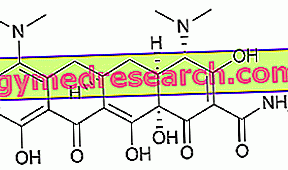Watch the video
X Watch the video on youtubePremise
Some natural remedies can facilitate the resolution of certain health problems: one of the most common is undoubtedly gastritis. In this article we will give a brief explanation of the disease, illustrating the natural remedies that can help speed up recovery by supporting any medications prescribed by your doctor. As we will see, even common foods can provide valid support for treatments against gastritis.
What is gastritis?

Often, gastritis is not the consequence of a single factor, being the multifactorial disorder, that is, dependent on multiple causes. Not surprisingly, many times at the base of the problem there is a genetic predisposition that is added to an unbalanced diet and an incorrect lifestyle. To consider, as an etiological factor, also stress, which is practically ubiquitous in the Western population today, affecting both sexes of all ages without distinction. Even a lack of nutrition education, climate change, physical inactivity, infections, smoking and the frenetic pace of work can be causes that increase gastritis.
Among the characteristic symptoms of gastritis we mention:
- aerophagia,
- Halitosis,
- Anorexia,
- Bitter mouth,
- Heartburn,
- Bad digestion,
- Nausea
- He retched.
Natural remedies
To prevent gastritis on a functional basis, therefore separated from organic, iatrogenic (drug-related gastritis) or autoimmune diseases, there are some measures that are essentially based on the correction of eating habits:
- Do not mix proteins with carbohydrates
- Avoid excess coffee and wine
- Do not smoke or drink alcohol
- Chew slowly
- Consume fruit away from meals, because it can create swelling
- Avoid fried foods
- Always have lunch and dinner at the same time
In general, if the subjects predisposed to gastritis respect these rules, the problem will be easier to overcome. Nature has always offered a vast quantity of products: it is up to man to treasure these offerings or not. Natural therapies, if correctly applied, can be of great help to lighten the problems and "strengthen" the stomach and intestines.
For further information: diet and gastritis, nutrition and gastroesophageal reflux.
To a correct lifestyle, natural remedies can be associated that mitigate the heartburn caused by gastritis: chamomile, cabbage, carrot, potato, licorice, mallow. Sodium bicarbonate is also widely used as a quick remedy for acidity and heartburn, but in some cases it can exacerbate the problem.
To learn more: natural remedies against gastritis.
CHAMOMILE
Its essential oil is used to relax the stomach muscles; thanks to this action, called antispastica, the chamomile gives relief from cramps and abdominal pains. The habit of drinking a herbal tea made from highly concentrated chamomile is a good prevention against relapse of gastritis.
CABBAGE
Cabbage has healing properties for the mucous membranes of the digestive tract: a glass of cabbage juice, combined with carrot and blueberry juice (which not only corrects the taste, but gives it a good antioxidant power), could lighten gastritis.
CARROT
The carrot, rich in pectin - which can be deposited as a sort of gel on the gastric walls repairing them from the acid insult - contains another substance that protects the mucosa from the attack of microorganisms: beta-carotene. The precursor of vitamin A is therefore classified as an excellent natural remedy against gastritis, also because it could promote the healing of any wounds (ulcer).
POTATO
The potato has emollient properties, as well as calming the inflammation in the stomach, causing a pleasant feeling of relief.
LICORICE
It would be a good habit to chew pieces of licorice to alleviate the discomfort caused by gastritis. In the event that the subject suffered from hypertension, licorice is not recommended, because at high doses it favors the pressure rise.
MAUVE
Also an infusion based on mallow is useful in the case in which the gastritis is associated with repeated abdominal cramps: the mallow is a good natural remedy that gives relief to the irritated stomach.
GREEN TEA
The most important constituents of tea, in the case of gastritis associated with ulcer, are flavonoids, which stimulate healing. However, caffeine tends to decrease the tightness of the lower gastroesophageal sphincter favoring reflux.
SODIUM BICARBONATE
Baking soda is used to increase the pH of the stomach and therefore make the gastric environment less acidic; consequently, the burning sensation will be reduced by protecting the gastric mucosa from excessive acidity.
We recommend dissolving a teaspoon of baking soda in a little water and drinking it all.
Sodium bicarbonate is contraindicated in cases of hypertension and should never be taken together with meals that are too abundant (in the gastric environment it develops CO2, which relaxes the stomach walls and promotes acid secretion: see article dedicated to antacid drugs).
In the case in which gastritis appears as a very frequent disorder, the herbalist's advice is to regularize the diet, preferring foods such as carrots, fennel and potatoes, and natural remedies such as Licorice, Passiflora, Chamomile, Melissa, Chamomile, Anise, cumin, rosemary, thyme, flax, aloe, altea, island lichen, mallow, apple, nettle.
After this analysis, the meaning of many verbal expressions of the common language, which associate the stomach with certain emotions, is more understandable:
"How many must I swallow!"
"I don't digest this!"
"The thought alone makes me sick!"
"I have a heavy weight on my stomach!"
"You have to have a good stomach to behave this way!"
Recommended foods and not recommended
FOODS NOT RECOMMENDED IN CASE OF GASTRITIS | FOOD RECOMMENDED IN CASE OF GASTRITIS |
Pepper, red pepper | Brown rice and whole wheat pasta |
Alcohol, coffee | Oats and brown rice |
Cocoa | Sesame seeds |
Citrus fruits, sour fruit | Orange vegetables (source of beta-carotene), but not citrus fruits |
Dried fruit | Potatoes |
tomatoes | Cabbage |



